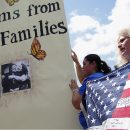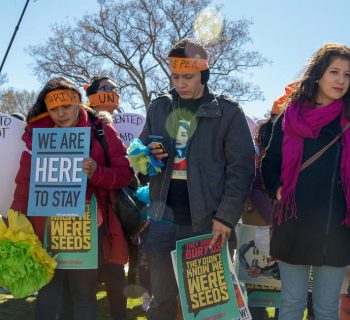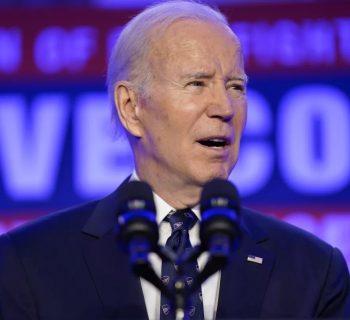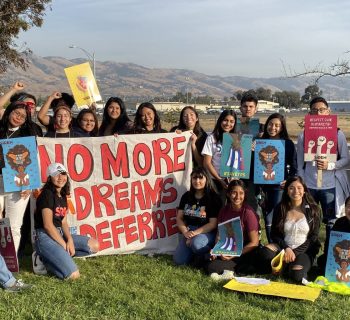A bipartisan group of senators unveiled legislation Friday that would extend key legal protections and work permits to a select group of young undocumented immigrants brought here as children — a status that’s threatened by Donald Trump’s campaign pledge to repeal President Barack Obama’s executive actions to enact those benefits.
Sens. Dick Durbin (D-Ill.) and Lindsey Graham (R-S.C.) are promoting the so-called Bridge Act, which would allow at least 740,000 young immigrants who have gotten deportation reprieves and work permits under Obama to keep those benefits for three more years if they are revoked. Three other senators are original co-sponsors of the bill: Sens. Lisa Murkowski (R-Alaska), Dianne Feinstein (D-Calif.) and Jeff Flake (R-Ariz.). Durbin and Graham are hoping to collect additional sponsors.
“I can’t go anywhere where I’m not approached by someone who raises this issue, either personally or religious,” Durbin said during a pen-and-pad with a small group of reporters on Friday. “We wanted to move on it quickly.”
It's unclear how far the measure will go in the GOP-controlled Senate, much less the more conservative House. GOP leadership has said generally that they want to wait and see how the Trump administration handles the issue before making any decision on how to deal with DACA beneficiaries.
“In my view, the [executive action] issued by President Obama was unconstitutional and President-elect Trump would be right to repeal it," Sen. Lindsey Graham (R-S.C.) said in a statement Friday. "However, I do not believe we should pull the rug out and push these young men and women — who came out of the shadows and registered with the federal government — back into the darkness.”
Trump has said he would undo Obama’s executive action, known formally as Deferred Action for Childhood Arrivals, and has not backed off that pledge publicly. But the president-elect has taken a noticeably softer tone toward Dreamers, praising them in a Time magazine in an interview published this week and noting that “they’re in never-never land because they don’t know what’s going to happen.”
“I’m going to seize on every encouraging word,” Durbin said. “Those words in Time magazine were encouraging.”
The bill would actually apply to a broader group of Dreamers than just current DACA beneficiaries; Durbin said negotiators agreed to expand the bill’s eligibility to other young undocumented immigrants who may not have DACA currently but would be approved under the program. That would cover, for instance, a 14-year-old who ultimately becomes eligible for the benefits (DACA requires applicants to be at least 15 years old). They would all have to pay a fee, register with the government and pass background checks.
The legislation also enacts tougher confidentiality protections than what is currently afforded under the existing DACA program. It would bar personal information such as the immigrants’ home addresses from being used for deportation purposes, unless it involved national security concerns or a criminal felony investigation. That is meant to ensure that parents of DACA beneficiaries wouldn’t get swept up in order to be deported.
Extension of those benefits would only be valid for three years under the bill. So if theory, if this measure became law in May 2017, it would disappear in May 2020 — forcing Congress to work out broader immigration reform in the meanwhile.
Some on the left have raised concerns that focusing too tightly on Dreamers — generally the most sympathetic group of undocumented immigrants — would threaten any chance of aid for the broader population of 11 million immigrants here illegally. One senator who has hammered that point is Sen. Bob Menendez (D-N.J.), who declared in a floor speech Thursday: “I do not intend to sacrifice one set of immigrants for another.”
Durbin said he has spoken repeatedly to Menendez in private about those concerns.
“I’ve made it clear to him: We still have an important job in comprehensive immigration reform but it would be disastrous and just to say that we are going to ignore what’s gonna happen to the lives of these DACA individuals,” Durbin said. Noting that nearly 30 medical students at Loyola University in Chicago would have to drop out of school if their DACA status was revoked, Durbin added: “Bob doesn’t want that to happen, I don’t want that to happen.”







